Embarking on the journey of installing a 12×24 inground pool begins with a crucial question, How much does a 12 x 24 inground pool cost? This question is more than just a query it’s a gateway to understanding the investment in a backyard transformation.
The cost of such a pool encompasses not only the initial installation but also the ongoing maintenance that ensures its longevity and allure. In this article, we’ll delve into the financial aspects of owning a 12×24 inground pool, providing prospective pool owners with a comprehensive overview of the expenses involved in bringing this luxurious addition to their home.
Table of Contents
What is a 12×24 Inground Pool?
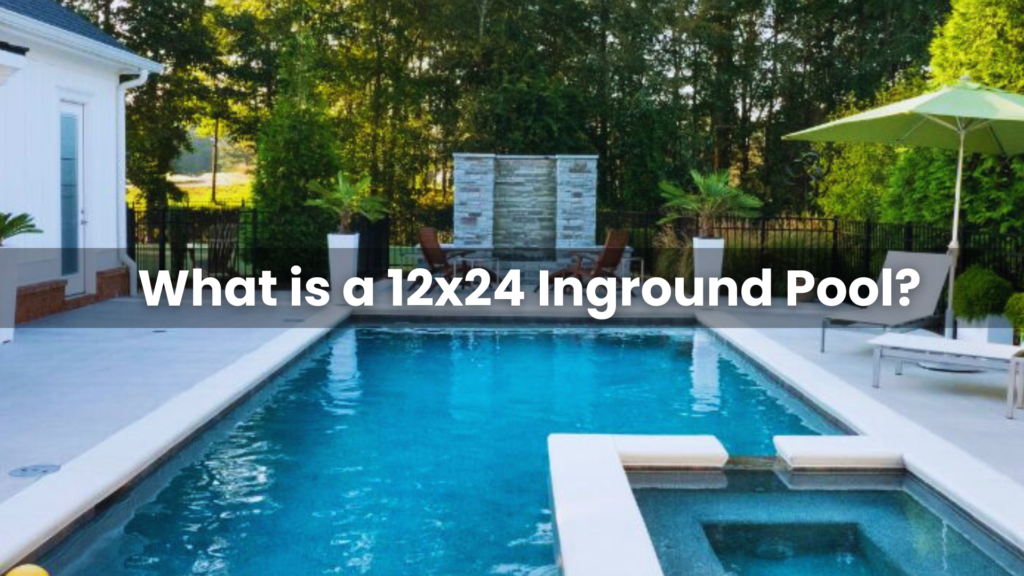
A 12×24 inground pool refers to a swimming pool that is 12 feet wide and 24 feet long, installed below ground level in your backyard or chosen outdoor space. This size is considered a medium-sized pool, which is ample for family use, casual swimming, and even some pool games. It’s a popular choice for those who want the benefits of an inground pool without committing to the larger sizes that require more space and maintenance.
In terms of design, a 12×24 pool can come in various shapes such as rectangular, which is the most common due to its efficient use of space and ease of covering. Other shapes like kidney or freeform are also possible, depending on personal preference and the landscape of the area. These pools can be constructed from different materials, including fiberglass, concrete, or vinyl, each offering unique benefits and aesthetic appeal.
The depth of a 12×24 inground pool typically ranges from 3 feet on the shallow end to 8 feet or more on the deep end, though this can be customized based on the owner’s requirements. Some pools may include additional features like built-in steps, benches, or even a spa section, enhancing the overall swimming experience.
Why Choose a 12×24 Size?
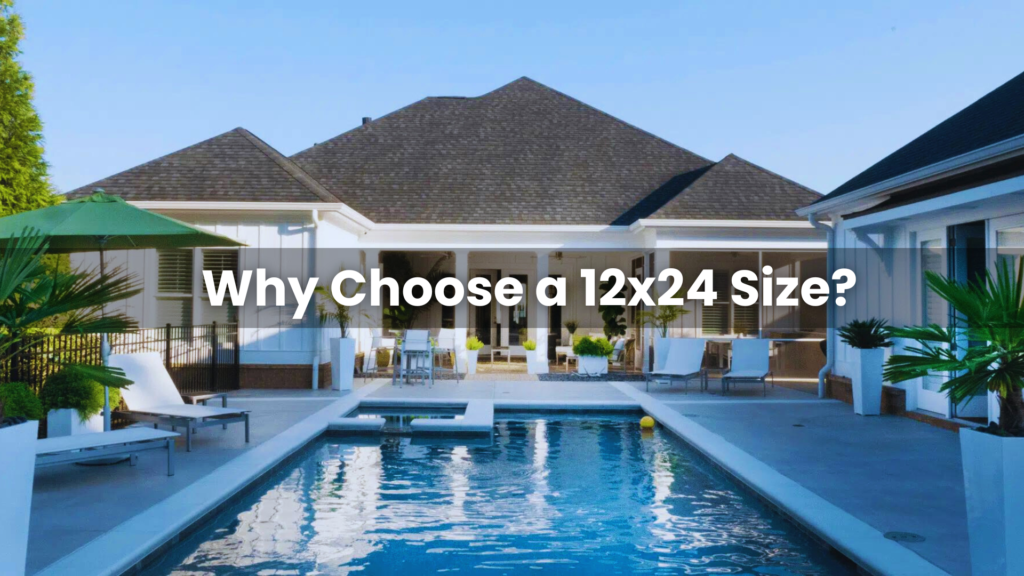
Choosing a 12×24 size for an inground pool is often driven by the balance it offers between usability and practicality. This size is substantial enough to allow for a variety of activities, including swimming laps, playing water games, and simply relaxing, yet it is not so large that it becomes overwhelming to maintain or requires a vast amount of space.
Advantages of a 12×24 Inground Pool:
Space Efficiency: A 12×24 pool is compact enough to fit in most backyards while still providing ample space for enjoyment.
Cost-Effective: Compared to larger pools, a 12×24 pool is more affordable in terms of initial installation and long-term maintenance costs.
Versatility: This size is versatile for different uses, whether it’s for family fun, fitness, or relaxation.
Customization: Despite its standard size, there is plenty of room for customization with features like steps, benches, or a spa area.
For families or individuals who do not require a pool for competitive swimming or large social gatherings, a 12×24 inground pool can be the perfect fit. It provides a comfortable swimming experience for both adults and children and can feel larger than it is with the right design and features, creating a luxurious oasis in your backyard.
Moreover, a pool of this size is recommended for a family or group of 3-4 people, giving each swimmer approximately 72 sq. ft. of space to swim and play. It’s a practical choice that meets the needs of most homeowners without the extra costs associated with larger pools.
Factors Influencing the Cost of a 12×24 Inground Pool
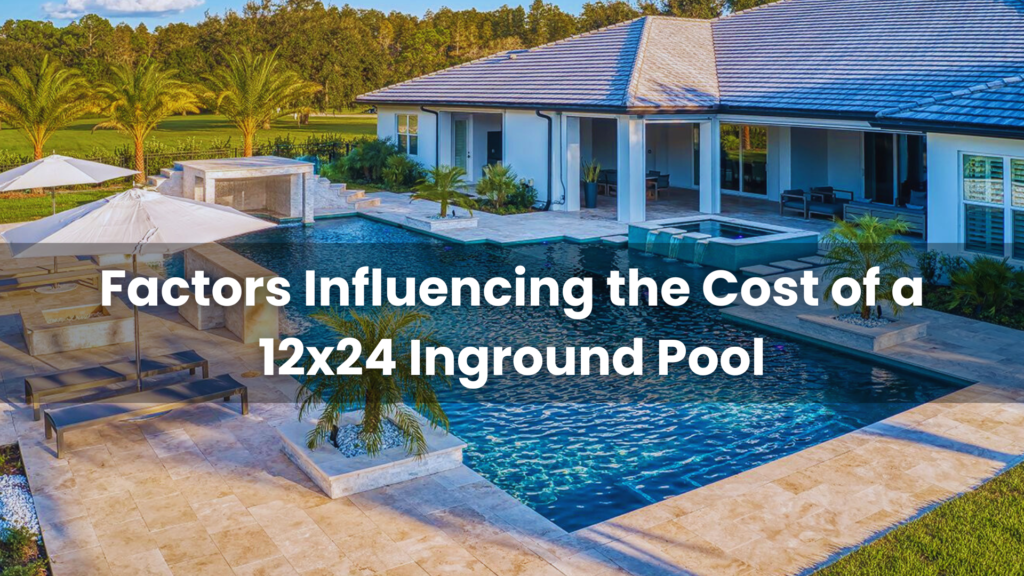
When considering the installation of a 12×24 inground pool, several factors come into play that can influence the overall cost. Understanding these factors will help you budget accordingly and make informed decisions throughout the process.
Key Factors Affecting Pool Cost:
Material: The type of material you choose for your pool be it fiberglass, concrete, or vinyl will significantly impact the price. Fiberglass tends to be more cost-effective and quicker to install, whereas concrete pools are more durable but also more expensive.
Design and Features: Custom features such as waterfalls, lighting, slides, or integrated spas can elevate the cost. The complexity of the pool’s design also plays a role; a simple rectangular pool will be less costly than a freeform or custom shape.
Labor and Installation: The cost of labor varies by region and the complexity of the installation. Excavation, plumbing, and electrical work are necessary parts of the process that can add to the cost.
Landscaping: After the pool is installed, additional landscaping may be required to restore the surrounding area or to enhance the pool’s aesthetics, which adds to the overall expense.
Maintenance Equipment: Pumps, heaters, filters, and cleaning systems are essential for keeping your pool in top condition and can add to the initial investment.
Permits and Fencing: Depending on your locality, you may need to obtain permits before construction can begin. Safety fencing is also often a legal requirement and should be factored into the cost.
Long-term Costs: Consider the long-term costs of pool ownership, including regular maintenance, repairs, and potential increases in property taxes.
To provide a rough estimate, a 12×24 inground pool can range from $28,000 to $55,000 or about $50 to $125 per square foot, depending on the factors mentioned above4. However, these figures can vary widely based on your specific choices and local market conditions.
How Much Does a 12×24 Inground Pool Cost?
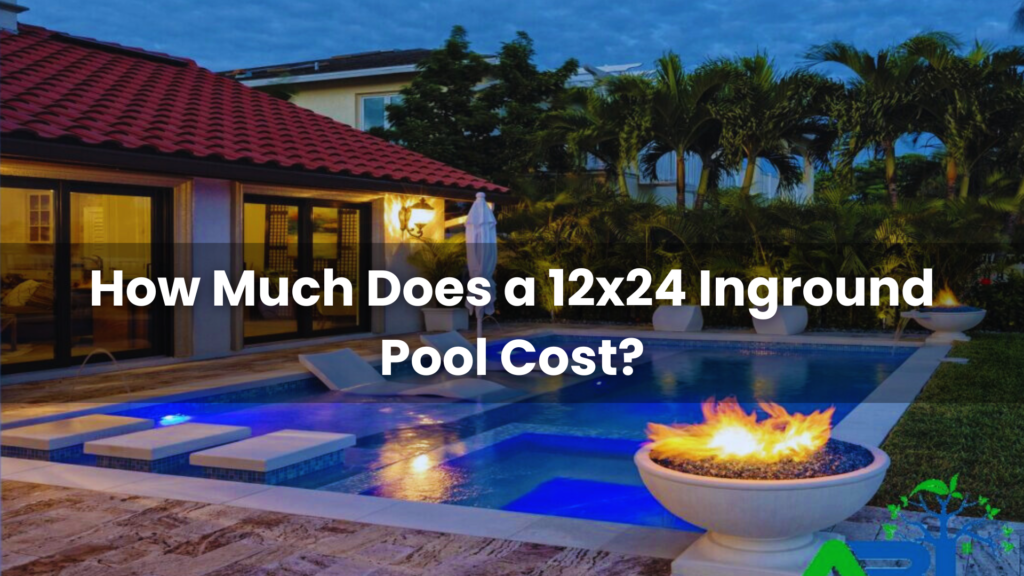
The cost of a 12×24 inground pool is a crucial consideration for homeowners looking to add value and enjoyment to their property. This size pool is a popular choice due to its manageable size and the balance it offers between cost and functionality.
Average Cost Breakdown:
The average cost of a 12×24 inground pool is approximately $25,200, with per-square-foot costs ranging from $90 to $160.
The total cost can vary from $28,000 to $55,000, depending on various factors such as materials, design, labor, and additional features.
Material Costs:
Vinyl: The most cost-effective option, ranging from $28,000 to $40,000.
Fiberglass: Offers a balance between cost and ease of maintenance, costing between $28,000 to $60,000.
Concrete: The most durable and customizable option, with costs ranging from $50,000 to $100,000.
Additional Features:
Adding a hot tub can cost an additional $6,000 to $15,000.
Pool lighting may add another $700 to $1,800 to the overall cost.
Installation and Labor:
The installation process includes excavation, plumbing, electrical work, and possibly landscaping, which all contribute to the total cost.
Turn-key packages for inground pools, which cover everything from excavation to decking, can range from $35,000 to $100,000.
Long-Term Costs:
Maintenance equipment, repairs, and potential increases in property taxes should also be considered as part of the long-term costs of owning a pool.
Average Cost Breakdown of a 12×24 Inground Pool
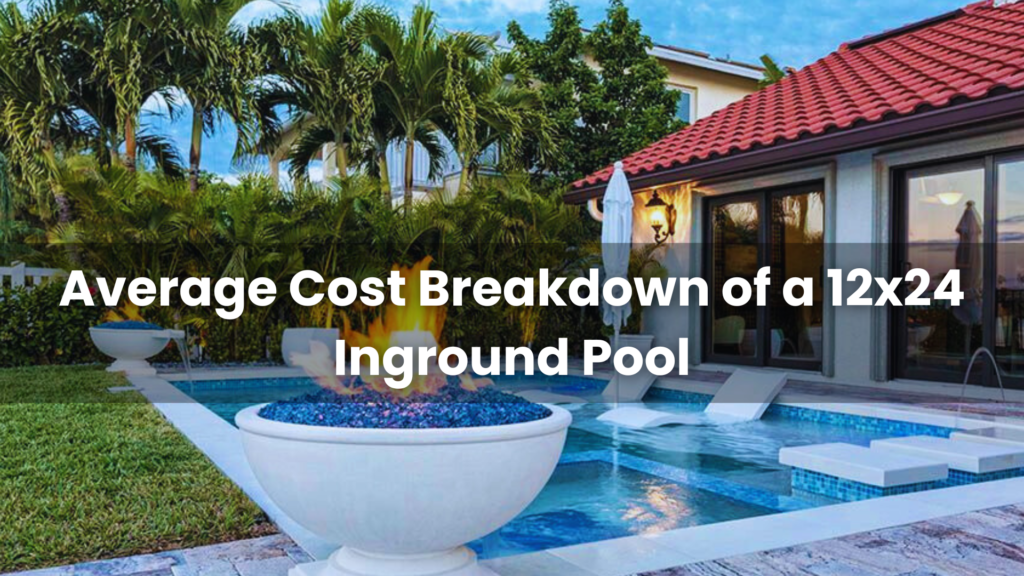
When planning for a 12×24 inground pool, it’s essential to understand the average cost breakdown to budget effectively. This size pool is a popular choice for its balance of space and cost, and here’s how the expenses typically distribute:
Average Cost Breakdown:
Material Costs: The choice of material vinyl, fiberglass, or concrete will be the most significant factor in your pool’s price. On average, vinyl pools cost between $28,000 to $40,000, fiberglass pools range from $28,000 to $60,000, and concrete pools can cost anywhere from $50,000 to $100,000.
Installation and Labor: This includes excavation, plumbing, electrical work, and decking. The average cost for installation and labor can range from $28,000 to $55,000, sometimes going upwards of $65,000 for special customizations.
Additional Features: Features like a hot tub or pool lighting can add $6,000 to $15,000 and $700 to $1,800 respectively.
Landscaping: After installation, you might need additional landscaping to integrate the pool into your backyard, which can cost anywhere from $100 to $45,000.
Permits and Fencing: Required permits and safety fencing can add $200 to $300 and more to your total cost.
Taking all these factors into account, the average cost for a 12×24 inground pool is approximately $25,200, with per-square-foot costs ranging from $90 to $1603. However, depending on your location, choice of materials, and additional features, the total cost can vary significantly.
Long-Term Costs of Owning a 12×24 Inground Pool
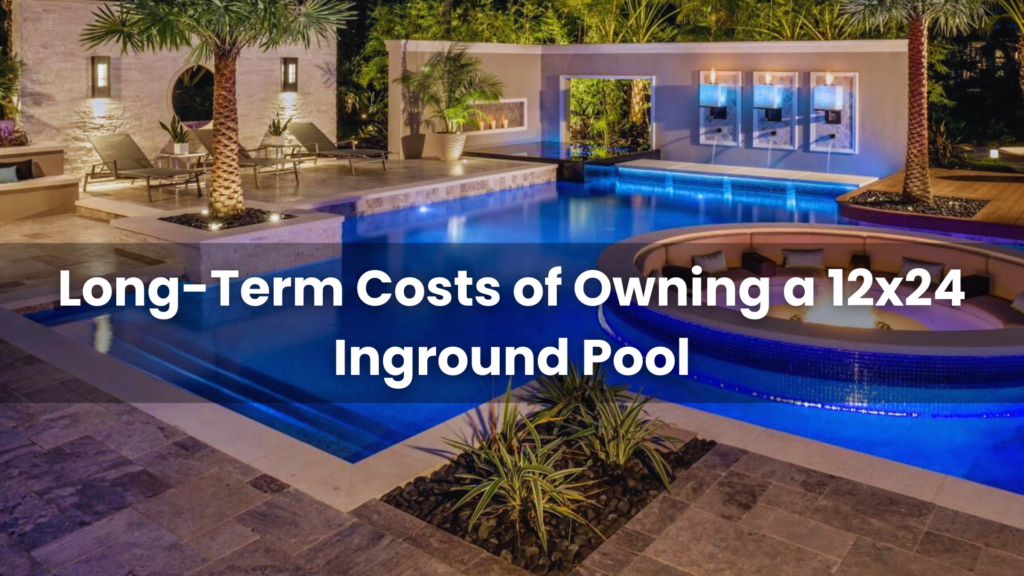
Owning a 12×24 inground pool comes with various long-term costs that are important to consider when making the decision to install one. These costs ensure that the pool remains a safe, enjoyable, and beautiful part of your home for years to come.
Long-Term Costs Include:
Maintenance: Regular cleaning and chemical balancing are essential. Annual maintenance costs can range from $1,200 to $3,000.
Repairs and Replacements: Over the life of the pool, you may need to repair or replace equipment like pumps, heaters, and liners. This can cost several thousand dollars.
Utilities: Increased water and energy usage for pool filtration and heating systems will affect your utility bills.
Insurance: Some homeowners’ insurance policies may increase by $50 to $100 annually due to the added liability of a pool.
Additional Costs: These can include pool covers, safety equipment, and accessories, which can add about $2,000 or more.
How to Get the Best Value for Your 12×24 Inground Pool
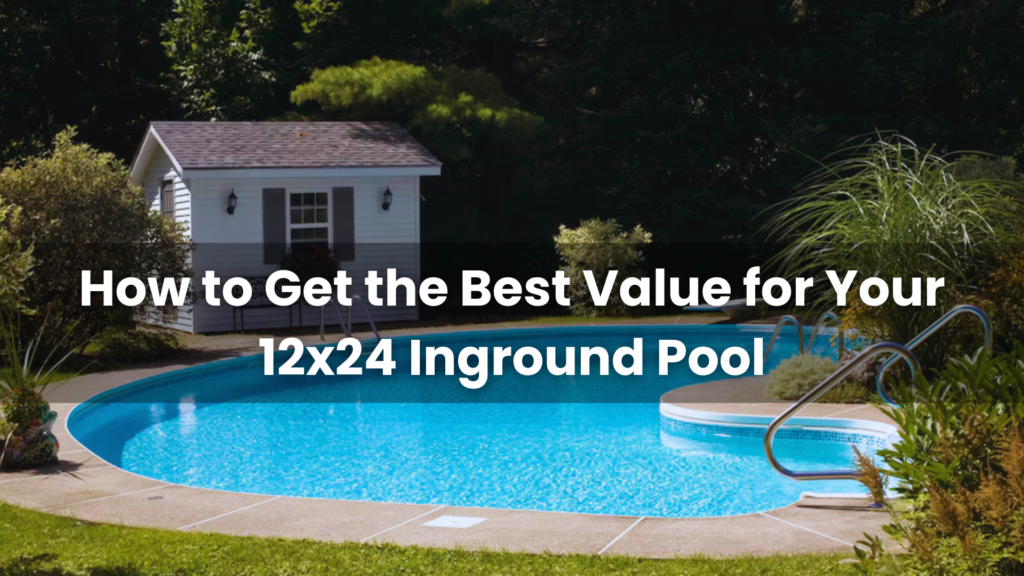
To get the best value for your 12×24 inground pool, it’s important to consider both the initial investment and the long-term enjoyment and costs. Here are some strategies to ensure you get the most out of your pool:
1. Choose the Right Material: Select a pool material that offers a balance between upfront cost and longevity. Fiberglass is a popular choice as it requires less maintenance and has a lower cost over its lifetime compared to concrete.
2. Compare Quotes: Get multiple quotes from different contractors to ensure competitive pricing. Don’t just look at the bottom line; consider the quality of materials and the reputation of the builder.
3. Optimize Features: Decide which features are must-haves and which are nice-to-haves. Essentials like a good filtration system and energy-efficient pump will pay off in the long run, while luxury features should be weighed against their long-term value.
4. DIY Some Tasks: Consider handling some tasks yourself, like landscaping or decking, if you’re handy. This can reduce costs significantly.
5. Plan for Efficiency: Invest in energy-efficient equipment and a pool cover to minimize heating and maintenance costs. This will reduce your long-term expenses.
6. Seasonal Purchasing: Sometimes, you can get better deals during the off-season when demand for pool installation is lower.
7. Long-Term Maintenance: Regular maintenance can prevent costly repairs down the line. Set up a maintenance schedule and stick to it.
8. Bundle Services: If you’re also doing other home improvements, see if you can bundle services with a contractor for a discount.
How to Estimate Inground Pool Costs
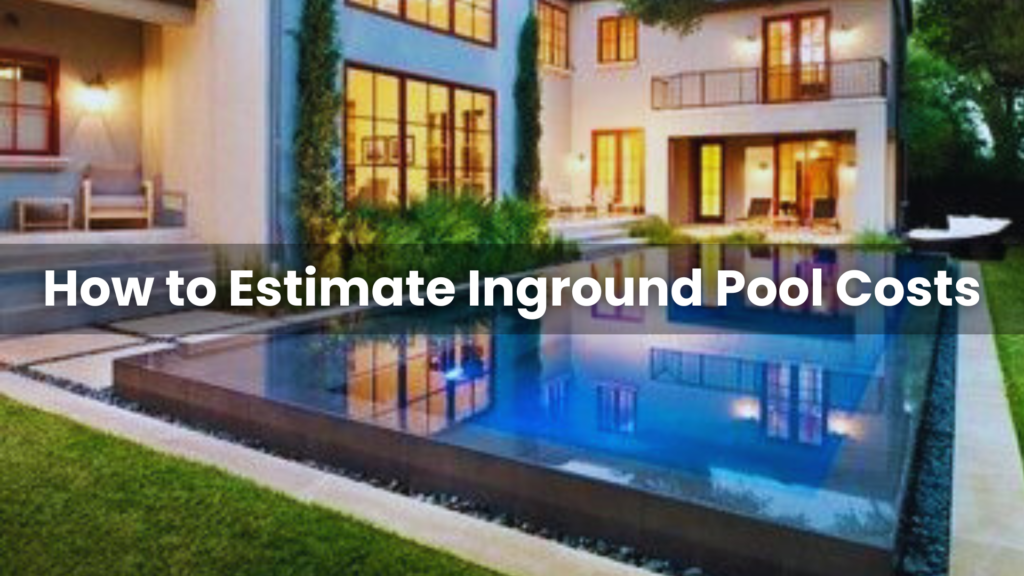
Estimating the cost of a 12×24 inground pool involves a comprehensive understanding of the various factors that contribute to the overall price. Here’s a step-by-step guide to help you create an accurate estimate:
Determine the Pool Type and Material: Decide whether you want a vinyl, fiberglass, or concrete pool. Each material has different cost implications, with vinyl being the least expensive and concrete the most.
Calculate the Base Price: The base price is determined by the size and material of the pool. On average, costs range from $50 to $125 per square foot.
Factor in Design Complexity: Custom shapes, depths, and designs can increase the cost. A standard rectangular pool will be less expensive than a custom-designed one.
Consider Installation Costs: These include excavation, plumbing, electrical work, and the construction of the pool itself. Installation costs can vary greatly depending on your location and the complexity of the job.
Add the Cost of Features and Accessories: Features like lighting, heaters, covers, and landscaping will add to the total cost. Prioritize which features are essential for your needs.
Account for Permits and Fencing: Check local regulations to determine the cost of necessary permits and safety fencing required for pool installation.
Estimate Long-Term Costs: Maintenance, repairs, and utilities are ongoing costs that should be included in your estimate. These can add a significant amount to the annual cost of owning a pool.
Get Quotes from Contractors: Once you have a rough estimate, get quotes from several contractors to compare prices and services offered.
Financing Your 12×24 Inground Pool
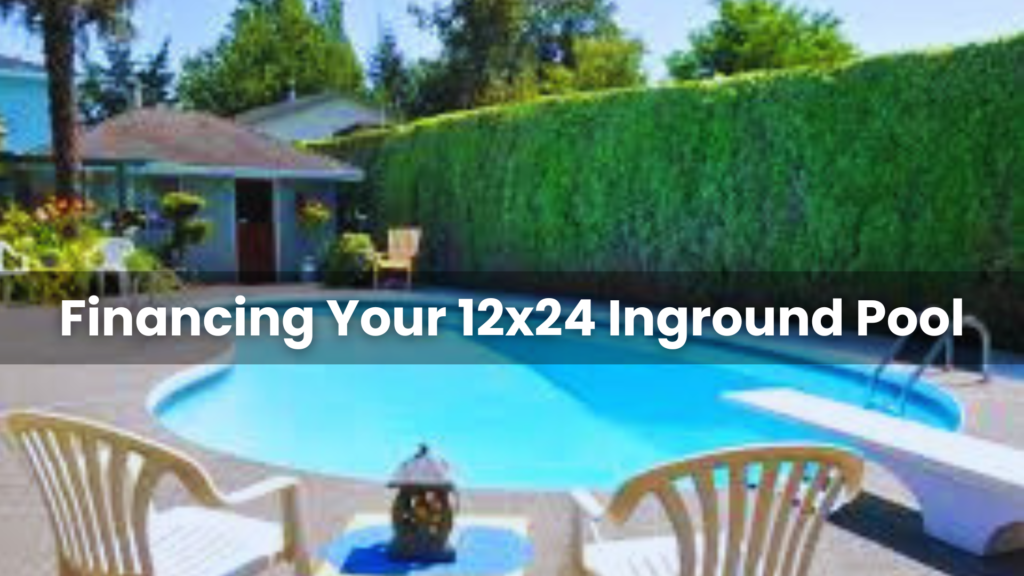
Financing a 12×24 inground pool is a significant aspect of the pool installation process, as it involves a substantial financial commitment. There are several financing options available to homeowners, each with its own set of benefits and considerations.
Financing Options for a 12×24 Inground Pool:
Cash-Out Refinance: This option allows you to refinance your mortgage and take out the difference in cash. It’s a good choice if you have equity in your home and can secure a lower interest rate.
Home Equity Line of Credit (HELOC): A HELOC works like a credit card, giving you a line of credit based on your home’s equity. It offers flexibility and usually has lower interest rates than personal loans.
Home Equity Loan: Similar to a HELOC, a home equity loan is based on your home’s equity but is received as a lump sum with a fixed interest rate, which is ideal for a one-time project like a pool installation.
Personal or Pool Loan: Unsecured personal loans don’t require collateral and can be a quick way to finance your pool if you have good credit. The interest rates might be higher than home equity options.
Pool Manufacturer Financing: Some pool companies offer financing options for their customers, which can be convenient but may come with higher interest rates.
Credit Cards: While not typically recommended due to high-interest rates, credit cards can be used for smaller expenses associated with pool installation.
Conclusion
In conclusion, the cost of a 12×24 inground pool can vary widely based on factors such as materials, labor, location, and additional features. On average, homeowners might expect to spend anywhere from $25,000 to $50,000 for a basic setup. However, for those seeking more luxurious finishes or custom designs, the price can easily escalate. It’s essential to consider the long-term value and enjoyment a pool will bring to your home when evaluating how much does a 12×24 inground pool cost. Ultimately, investing in a quality inground pool can provide endless hours of entertainment and relaxation for friends and family.
Most Common Questions About How Much Does A 12×24 Inground Pool Cost?
What is the average cost of a 12×24 inground pool?
The average cost for a basic 12×24 inground pool is typically around $25,000 to $35,000. However, this can vary based on materials, labor, and additional features.
Does the cost include installation?
Yes, the estimated cost usually includes installation. However, it’s important to confirm with your pool provider as some may offer different packages.
What factors can affect the cost of a 12×24 inground pool?
Several factors can influence the final price, including the type of materials used (vinyl, fiberglass, concrete), the complexity of the installation, the region you live in, and any additional features or customizations.
Can I expect any additional costs apart from the installation?
Yes, there may be additional costs for landscaping, permits, pool equipment, and ongoing maintenance. It’s crucial to budget for these when planning your pool project.
Is financing available for inground pool installation?
Many pool installation companies offer financing options. It’s advisable to discuss this with your provider to understand the terms and conditions.
How long does it typically take to install a 12×24 inground pool?
The installation time can vary, but it generally takes several weeks to a few months from start to finish, depending on the complexity of the project and weather conditions.
Will a 12×24 inground pool add value to my home?
While a pool can enhance the aesthetic appeal and enjoyment of your home, its impact on property value can vary. In some markets, a pool may increase property value, while in others, it may not have a significant effect.
Are there any hidden costs I should be aware of?
Hidden costs can include things like increased utility bills for pool operation, insurance rate changes, and potential repairs down the line. It’s best to inquire about these potential expenses upfront.
Recommended: How Much Do Kayak Pools Cost

Nigel Foster, born in 1952, is an esteemed sea kayaker, known for being the youngest to kayak around Iceland. His journey in kayaking started at 15 in Brighton, England. With a career beginning as a trainee instructor in Sussex, he later pursued teaching after attending Redland College, Bristol.
Foster’s notable expeditions include navigating the challenging waters of Newfoundland and the Hudson Strait. Despite facing intense conditions, his passion for kayaking never waned. He holds several British Canoe Union qualifications and has significantly contributed to the kayaking community through teaching and committee work.
In 1985, Foster expanded his horizons by assisting an expedition in Iceland and later founded his own kayaking business, sharing his expertise globally.
